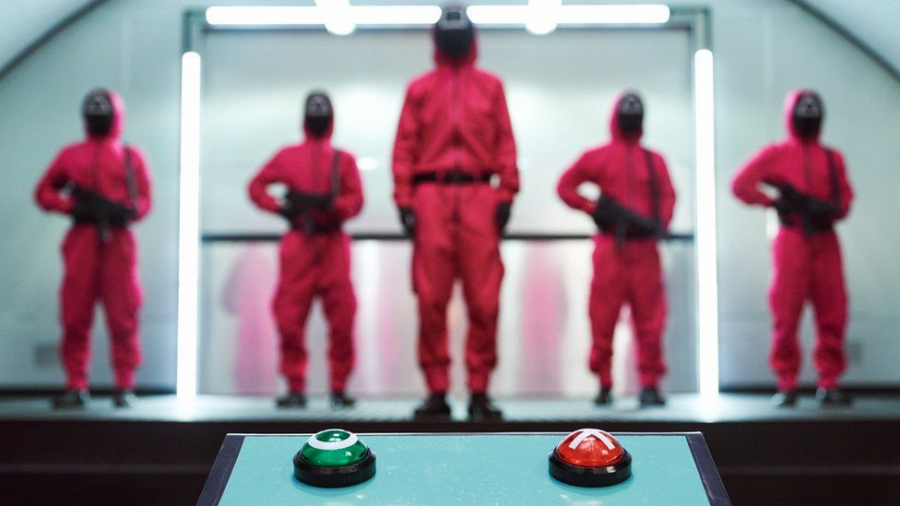Squid Game: an Analysis
October 29, 2021
Squid Game is filled to the brim with symbolism and layered meanings. There are too many to go over in a single article, but let’s go through the most important details of Netflix’s biggest debut hit to date. WARNING: Spoilers ahead, so if you haven’t finished watching the show, stop reading!
VIP Servants
The servants of the VIPs are dehumanized with animalistic body paint and objectified since they are forced to act as furniture. The VIPs do not care about anyone of a lower status than them. No, they are convinced that those who aren’t as wealthy as them are made to serve them.
Pink Soldiers
The pink soldiers only survive as long as they serve their purpose. The masks they wear represent how the VIPs don’t view those under them as people; rather, the soldiers are disposable carbon copies, just like the VIP servants. Anonymity is their most sacred rule, and breaking it is a death sentence.
The soldiers must carry out cruel and disgusting acts that strip them of their humanity, including murdering the players once they’ve failed a game and subsequently burning their bodies. If the soldiers step out of line or do not follow through with their assigned tasks perfectly, then they are killed, simple as that.
In a real sense, this relates to how the VIPs and the upper class try to oppress those below them with unreasonable working conditions so that the working class does not rise up and take back what they deserve.
Use of Numbers
The names of the participants aren’t used because that would humanize them. After all, if they’re just numbers, why feel bad when one is crossed off the list? Even to us, the audience, each time a player’s tile is blacked out after their death, it seems insignificant, especially when they haven’t been focused on in the story. They’re just another character—just another number—which is exactly what the VIPs had intended. After all, according to them, out of 456 participants, only one will win; thus, why take the time to memorize names?
This applies to real life and the class system. Squid Game evinces how the upper class doesn’t care about people who are lower-income; to them, the working class is insignificant and barely worth the time. Clearly, this is a disgusting mindset and further illustrates the fact that the VIPs and upper class have lost their empathy and humanity.
The VIPs
Clad in elaborate, golden animal masks, the VIPs evince how the upper class are so far removed from reality that they find entertainment from the suffering of the lower class. They spend billions of won for their personal entertainment instead of giving the money to the people who truly need it, further promoting violence and bloodshed. Instead of giving their money to the people who need it in a gesture of charity and kindness, they make it a prize that only one person receives after being the victor of six brutal and perverted children’s games.
To understand the VIPs a little better, let’s take a look at their masks and how each one represents something unique.
The lion is a representation of power, ferocity, and military might. Squid Game was enforced by the pink soldiers, who exemplify military might. They have chilling and fierce facades, and they don’t get intimidated by anyone. After all, when they’re with the game participants, they hold the most power in the room since they control who lives and dies.
The eagle represents freedom and courage, which is kind of ironic because those in debt barely had any freedom–banks wouldn’t loan them money, and they struggled to survive because of it. The debtors’ only options were prison, death, or Squid Game (which is technically the same as death because the end result would be death unless they were the single victor).
The bear, among other means, symbolizes the ability to evolve, but it’s also a type of market that describes falling stocks. The bull, on the other hand, symbolizes strength and masculinity, but describes a market where stocks rise. While their symbolism could note how the players of the game had to evolve and be strong in order to survive, these animal masks could also represent the two main features of the game: the debtors (those who have lost money like in a bear market) and the wealthy (who increasingly gain money like in a bull market).
The deer represents innocence, kindness, and grace. This is ironic because Squid Game was nothing like these characteristics; in fact, it took them away. When the players entered the game, they were stripped of any innocence or kindness they had left in order to survive. Even Seong Gi-Hun (Player 456), who tried to keep his humanity and morality throughout the games, was about to murder Cho Sang-Woo (218) after the latter had killed Kang Sae-byeok (067). Furthermore, there was no grace in the games, nor in the deaths. Whether players were shot after losing or shoved off the glass bridge, none of them were given the chance to die without brutality.
The panther symbolizes competitiveness, darkness, and death. This one explains Squid Games well; after all, the competitive nature of the games was shrouded in dark intentions and ended in death for 454 players. The only players who made it out alive were Gi-Hun and Il-nam, and yet they are stained forever from the games.Whereas Gi-Hun obtained severe trauma from the games, thus tainting his bright spirit, Il-nam was corrupt from the beginning since he was the root of the games.
The last, and perhaps most important mask, is the owl, which represents wisdom. Oh Il-nam, as it turns out, was behind the games the entire time and, as such, knew everything. Seong Gi-hun, who was the only one to befriend him, was the one who won the games. It is clear that Gi-hun would not have survived without Oh Il-nam’s help, but the fact that the older man was behind the games all along was one of Gi-Hun’s breaking points.
In the article “The 3 Biggest Problems With ‘Squid Game’ — The #1 Show On Netflix,” a Forbes writer asserts that the VIPs are “deeply grating characters [that] jabber on and on and on, totally undermining their cool golden animal masks and any sense of dread or mystery they might have otherwise possessed,” which completely misses the point of the VIPs. The VIPs aren’t included in the show for mystery or intrigue; they’re there to illustrate how the upper class are so far removed from reality that they have lost their human qualities and have regressed to mere animals.
Character Motivations
The main participants who survived the longest and were most impactful to the plot—those of which include Seong Gi-Hun (456), Cho Sang-Woo (218), Kang Sae-byeok (067), Ali Abdul (199), and Oh Il-nam (001)—all evolved throughout the games.
At the beginning, Seong Gi-Hun was selfish, and only cared about paying off his debts and making sure his daughter still thought of him highly. By the end of the games, he was willing to give up the monetary prize in order to save Cho Sang-Woo’s life. Though Gi-Hun had beaten his opponent during the last game and would have only had to take a few more steps to claim his prize, he stopped and offered a truce. Even after Sang-Woo had just murdered Sae-byeok mere hours before, even after each betrayal and every backstab, Gi-Hun did not want his childhood friend to die.
The money could have saved Gi-Hun’s life—it could have paid off his debts and allowed him to travel to see his daughter whenever he pleased—but he put Sang-Woo’s life above his own. In the end, Sang-Woo made the choice for Gi-Hun, but it was Gi-Hun’s decision in the moments before that truly evinced how much he had changed during the games. His refusal to use the blood money for an entire year after the game only further proves how, despite the brutality of Squid Game, Gi-Hun wouldn’t allow it to take his morality.
Cho Sang-Woo, on the other hand, is a prime example of how greed corrupts the best of us. Most would consider Sang-Woo a villain; after all, the only reason he made it to the last game was through brutal and cold-hearted means. At face-value, he doesn’t seem redeemable in the least, but is he truly a villain or is he just a victim, warped by the system and taken advantage of by the game?
It was repeatedly mentioned how Sang-Woo was the pride of his hometown and went on to be a great businessman. While it’s revealed that that isn’t the case—in fact, Sang-Woo is in a mountain of debt that threatens his family and his mother—one could say that the pressures of society and capitalist greed were the things that crippled him the most and forced him into the game.
Must a character be either a villain or a victim? Can’t someone be both? It’s easy to admit that Sang-Woo was a villain—especially considering he murdered Sae-byeok and indirectly murdered Ali Abdul—but it’s harder to admit that he is also a victim, too. He’s hated as a character because he did what was necessary to survive in the games; if you were in his situation, what would you have decided?
Kang Sae-byeok was a prime example of how the upper class couldn’t care less about the struggle of those in need. Sae-byeok, a North Korean defect, needed the money in order to get her mother to safety and to take care of her younger brother. While this care should have been provided by the government, it could also have been provided by the upper class. However, the VIPs chose not to aid Sae-byeok in her time of need, despite the fact that she was a refugee, because she did not serve a purpose to them beyond entertainment.
When Sae-byeok was scammed out of her money—the money that was supposed to be used to help her mother escape the North—it wasn’t a big deal to the investigator who lost her money, it condemned not only Sae-byeok’s mother and brother, but Sae-byeok too, since she was forced to enter Squid Game once more. The investigator was fine, which illustrated how those who have known safety for their entire lives rarely put themselves into the shoes of others, especially the shoes of refugees.
Ali Abdul’s character, on the other hand, illuminates the exploitation of immigrants; they are forced to work long hours, usually in grueling conditions, for low pay. While the VIPs could have given Ali enough money to take care of his family for years to come (or at least enough to get back on his feet), they instead forced him to make the choice between working for a corrupt boss or fighting to survive in their brutal games for the sole purpose of their entertainment.
The VIPs and the soldiers all continuously preached about how in Squid Game, everyone was equal; no one had an advantage over anyone else. This, however, is proven to be false. After all, Ali—who had only recently immigrated to South Korea and did not know the country’s customs—had never played any of the Korean childrens’ games before, and was therefore at a severe disadvantage. This was not remedied by any help from the game masters, and the only reason he made it so long in the games was because of Sang-Woo, who later betrayed him.
Additionally, Ali is also used as a personification of innocence and trust, and it says a lot that he died by trusting the wrong person. Innocence doesn’t survive in the games, and neither did Ali. His heart, the very thing that endeared him to both Sang-Woo and the audience, led to his downfall.
The opposite of innocence is none other than the man behind the curtain, Oh Il-nam. The VIP orchestrated the entire game, knowing that the participants were desperate for money and would do anything to get it. The only reason he entered as Player 001 was because he knew that he was dying of a terminal illness and wanted to have some fun before he died. Fun, meaning a series of brutal games for the sole purpose of entertaining the upper class.
By the time he died—for real, this time—in the last episode, Il-nam had lost every ounce of humanity he might have had left. His extreme wealth and detachment from regular society left him as a cold, unfeeling shell. He got what he deserved, but his character evinces how the lives of lower income families don’t matter to the upper class; after all, they’re so far removed from reality that they cannot comprehend the problems of others.
Even in Il-nam’s final scene with Gi-Hun, he was inhumane till the end. Il-nam lost his bet with the other man, arguing that no one would help the needy. He was so sure of humanity’s inability to care for others, despite—or perhaps because of—his inability to show empathy or basic human decency. The most important takeaway from that scene is that Il-nam was wrong; there is still good in the world, no matter how little money people might have.
Conclusion
Squid Game is arguably the one of the best Netflix originals to date, and it’s clear to see why. At face value, it has great action and complex characters. It’s only when we dig deeper, do we truly discover the message that the writers tried so hard to convey.





